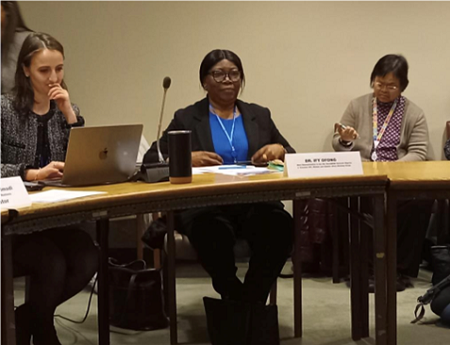Inclusive Social and Fiscal Policies: Key to Achieving Poverty Eradication and Women’s Right to Land and Habitat.
On 7 February 2024, WorldWIDE Network Nigeria and HIC organized a side event at the 62nd Commission on Social Development (CSocD62), at UN Headquarters, New York. The event was entitled “Inclusive Social and Fiscal Policies: Key to Achieving Poverty Eradication and Women’s Right to Land and Habitat,” with speakers and participants from HIC Members, allies and CSocD62 participants. The following summarizes the proceedings.
Speakers:
- Jean Quinn. Chair NGO CSociD, & Director UNANIMA International
- Mr. Dan Perell, Representative to the UN for BIC
- Ms. Lydia Stazen, Chair, NGO Working Group to End Homelessness, & Executive Director IGH, DePaul University, Chicago
- Dr. Ronald King, Representative to the UN, ACCN
- Dr. Ify Ofong, Main Representative to the UN, for WorldWIDE Network Nigeria: Women in Development and Environment. & Convener, HIC- Women and Habitat Africa Working Group
- Ms. Cecili Schirmeister, Representative to the UN for BIC
Sponsoring organizations:
• WorldWIDE Network Nigeria: Women in Development Environment. • Bahai International Community, New York.
• Habitat International Coalition.
Objectives
The main objective of the event is to highlight the key issues driving more people, particularly women into poverty and suggest effective strategies to address the situation. The event discussed how inclusive social and fiscal policies will enable governments and communities to achieve poverty eradication and implement the SDGs.
The event also focused on how women and girls in Sub-Saharan Africa and some other countries in the global south are faced with discrimination and barriers, such as lack of access, ownership, and rights to land, inheritance, and property among others, due to cultural and social norms.
Securing land and habitat rights can help safeguard women against domestic violence and poverty.
The key messages
The SDGs will not be fully achieved without addressing poverty and gender inequality. Similarly, we cannot eradicate poverty without addressing women’s rights to land and habitat.
Member States need to guarantee equal inheritance rights, implement gender-sensitive land laws and policies.
It is time to Identify and break down those traditional or customary barriers to women’s right to equitable and sustainable access to, use of, and control over land and habitat to achieve social justice and poverty eradication.
Cooperatives and the private sector have a key role in accelerating poverty eradication and ensuring women’s right to land and habitat and should be encouraged to thrive.
Outcomes and/or recommendations
There is an urgent need for Member States to implement and enforce all policies, resolutions, protocols, treaties, and conventions on gender equality and eradicate cultural norms and practices denying women their human rights.
Member States need to work with partners, including civil society organizations, community, and women leaders, as well as the private sector, to ensure that women’s right to land and habitat is guaranteed.
For more information about the 62nd Commission for Social Development (CSocD62), please visit: https://social.desa.un.org/csocd/62nd
Photo on the front page: CSocD62 Side Event organized by Worldwide Network Nigeria, Habitat International Coalition, and Bahai International Community (BIC): (L) Jean Quinn. chair NGO CSociD, and director of UNANIMA International; (C) moderator Mr. Andrew Allimadi, coordinator, Cooperative Issues, Division of Inclusive Social Development, UN DESA; (R) Cecili Schirmeister, representative to the UN for BIC. Photo on this p[age: Ify Ofong, main representative to the UN for WorldWIDE Network Nigeria: Women in Development and Environment, and convener, HIC-Women and Habitat Africa Working Group. Source: WorldWIDE Network Nigeria: Women in Development and Environment.














